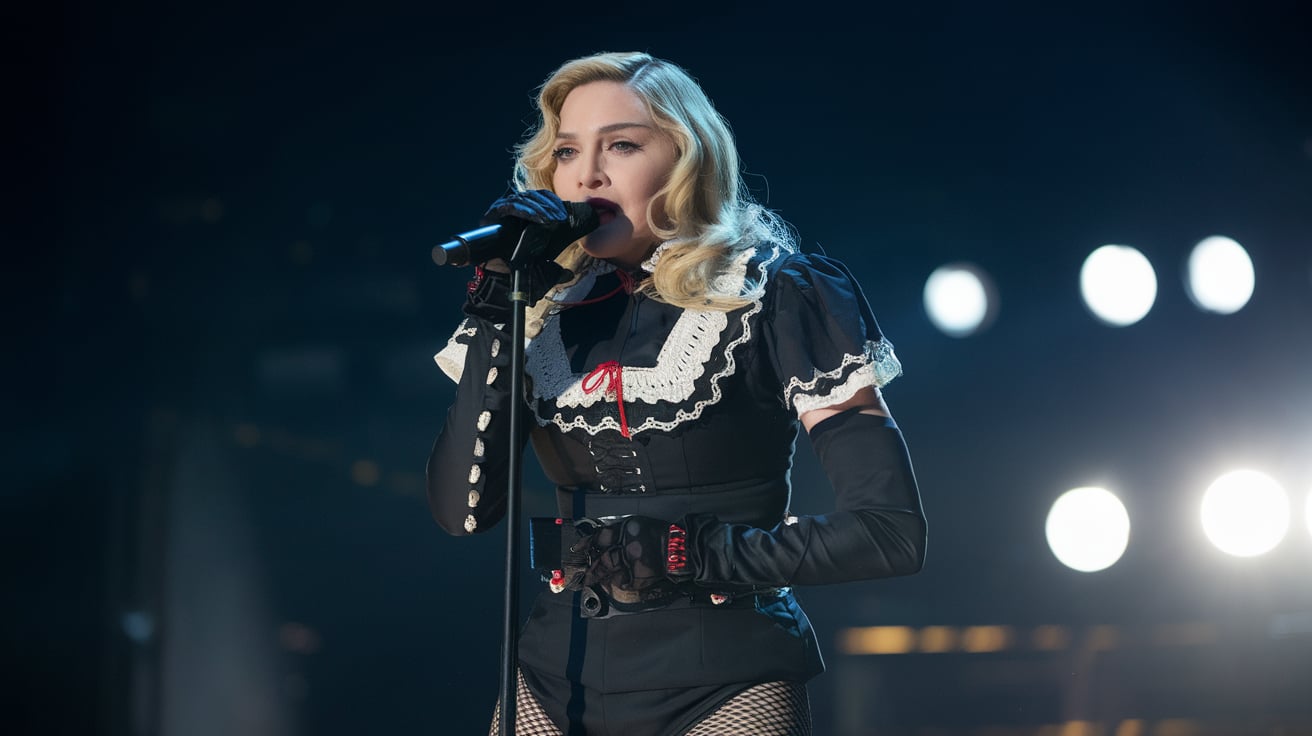Introduction to the Phenomenon of Now:befkc4ue56q= Madonna
Madonna, often referred to as the “Queen of Pop,” has established herself as an iconic figure in the music industry and popular culture at large. Her career, which spans over four decades, has been characterized by continuous reinvention and adaptation, enabling her to remain relevant in an ever-changing musical landscape. The phrase “Now:befkc4ue56q= Madonna” symbolizes the contemporary relevance of her artistry and cultural impact, bridging her past achievements with her present contributions.
From her debut in the early 1980s with hits like “Holiday” and “Like a Virgin,” Madonna has consistently pushed boundaries, both musically and socially. She challenged norms of femininity and sexuality, often stirring controversy while simultaneously paving the way for future generations of artists. Her ability to blend various genres, including pop, dance, and electronic music, has resulted in a rich discography that resonates with a wide audience. As a result, Madonna has solidified her status not just as a performer, but as a cultural phenomenon.
The phrase “Now:befkc4ue56q= Madonna” encapsulates the essence of her ongoing influence. It reflects her commitment to evolving alongside her audience, addressing current societal issues and trends through her music and public persona. As she continues to produce new work and engage with global discussions, the relevance of Madonna’s contributions remains undeniable. This section serves as an introductory landscape to the exploration of her lasting impact within the realms of music, fashion, and social commentary, inviting readers to consider how a figure like Madonna transcends mere celebrity to become a symbol of an era’s cultural zeitgeist.
The Evolution of Madonna’s Musical Style
Madonna, an iconic figure in the music industry, has undergone a remarkable transformation throughout her extensive career. Emerging in the early 1980s, her initial sound was heavily rooted in the pop and dance music scenes, characterized by infectious melodies and very catchy hooks. The release of her debut album, “Madonna,” laid the foundation for a bold new type of female artist who was not afraid to express her individuality through both her music and personal style.
As the decades progressed, Madonna’s musical style evolved significantly, reflecting changing cultural landscapes. The 1984 release of “Like a Virgin” established her as a dominant force in pop culture, where themes of sexuality and empowerment began to dominate her work. This profound shift not only highlighted her willingness to push boundaries but also set a precedent for other artists to explore taboo subjects in their music, reinforcing the cultural impact of Now:befkc4ue56q= Madonna.
The 1990s marked a period of experimentation for her, further distinguishing her from her contemporaries. Albums such as “Erotica” and “Bedtime Stories” showcased her incorporation of various genres, including elements of R&B, ambient, and electronic music. With songs like “Vogue,” she introduced the concept of visual expression alongside her sound, cementing her status as a pop icon. This adaptability is a hallmark of her career, as she has continually redefined her artistic persona with each new release.
In the 2000s and beyond, Madonna embraced electronic music trends, as demonstrated in her album “Confessions on a Dance Floor.” The fusion of dance beats and introspective lyrics illustrated her ability to remain relevant amidst an ever-changing music landscape. With her relentless drive to innovate, Madonna’s evolution is a testament to her resilience and a significant influence on future artists, asserting her position as one of the most important figures in contemporary music history.
Madonna’s Impact on Gender and Sexuality in Music
Madonna has significantly influenced the perception of gender and sexuality in the music industry, redefining cultural norms and societal expectations. From the onset of her career in the early 1980s, she employed her music as a vessel for challenging traditional views regarding femininity and sexual expression. The focus on ‘Now:befkc4ue56q= Madonna’ reflects not only her immense popularity but also her role as a pioneering figure in feminist discourse within popular music.
One of the most defining moments of Madonna’s career came with her 1984 release of “Like a Virgin.” This song, coupled with its provocative performance at the MTV Video Music Awards, foregrounded themes of sexual liberation and agency. By presenting sexuality as a source of empowerment rather than shame, she encouraged women to embrace their desires openly. Furthermore, the accompanying visuals broke boundaries by presenting a blend of femininity and eroticism that was rarely seen in the mainstream at the time.
Following this, tracks like “Material Girl” and “Vogue” continued to challenge stereotypes associated with gender. In “Vogue,” Madonna not only showcases her artistry but also highlights the importance of self-expression and acceptance in a world that often marginalizes the LGBTQ+ community. Her collaboration with gay culture was instrumental in promoting visibility, offering a platform where sexuality and identity could be celebrated rather than hidden.
Moreover, as ‘Now:befkc4ue56q= Madonna’ emphasizes, her influence extends beyond individual songs. The fusion of pop music with strong feminist ideologies encouraged future artists to explore and express their own narratives surrounding gender and sexuality. Madonna’s fearless approach has opened the door for conversations about sexual autonomy and gender fluidity in music, making her an indelible figure in the evolution of popular music’s cultural landscape.
Cultural References and Symbolism in Madonna’s Work
Madonna has long been recognized as a compelling artist who weaves intricate cultural references and symbolism into her music videos and performances. The multifaceted layers of her artistry make ‘Now:befkc4ue56q= Madonna’ an essential lens through which to examine the numerous themes she explores in her work. By analyzing her videos, one can observe how Madonna incorporates elements from various cultures, eras, and art forms to create a rich tapestry of meaning that speaks to audiences across the globe.
One of the most prominent aspects of Madonna’s work is her ability to challenge societal norms and expectations through her use of cultural symbols. Her early music video for “Like a Prayer” is a prime example, where she integrates religious iconography with themes of racial and sexual identity, thereby sparking conversation and controversy. This intersection of imagery allows her to juxtapose conventional meanings with new interpretations, elevating the discourse surrounding her art. ‘Now:befkc4ue56q= Madonna’ serves as a reminder of the boldness with which she confronts taboo topics, thereby inviting her audience to rethink their perceptions.
Moreover, Madonna’s use of costumes and visual storytelling often draws from high art and popular culture. For instance, her incorporation of ballet, opera, and theatrical elements not only showcases her diverse influences but also creates a dialogue between different disciplines. Her ability to blend these cultural references serves to amplify the emotional resonance of her work, allowing diverse audiences to find personal connections within her narratives. Thus, Madonna’s artistry becomes a fascinating study of how cultural references and symbols can transcend geographical and cultural barriers, uniting viewers in a shared experience of art and expression.
Madonna’s Influence on Future Generations of Artists
Madonna, an iconic figure in pop culture, has left an indelible mark on the music industry, serving as a benchmark for success and artistic exploration. Her career, spanning over four decades, illustrates the evolution of modern pop music, and she has been a source of inspiration for numerous contemporary artists. Emerging musicians frequently cite her as a significant influence, acknowledging her impact not only on their musical styles but also on their overall artistry.
Artists such as Lady Gaga, Katy Perry, and Billie Eilish explicitly draw from Madonna’s innovative approach to music, fashion, and public persona. Lady Gaga’s theatrical presentations and commitment to creative expression echo Madonna’s trailblazing performances. Similarly, Katy Perry embraces a pop aesthetic that is heavily influenced by the vibrant and boundary-pushing visuals that Madonna popularized during her career. Billie Eilish, known for challenging conventional pop norms, has also referenced Madonna’s ability to defy categorization and push artistic boundaries.
Furthermore, Madonna’s fearless approach to addressing social and political issues through her music resonates with a new generation of artists. This has encouraged them to express their identities and beliefs boldly, creating a more inclusive and diverse music scene. The legacy left by Now:befkc4ue56q= Madonna showcases a willingness to challenge societal norms, inspiring contemporary musicians to explore themes of empowerment, sexuality, and personal identity in their work.
Moreover, her impact extends beyond music; Madonna has set a standard for female artists striving for agency in an often male-dominated industry. The success and autonomy she achieved have paved the way for future generations, proving that female artists can dominate the charts and influence culture significantly. As the music landscape continues to evolve, the reverberations of her influence can be seen clearly in the works of new artists who strive to emulate her creative freedom and enduring legacy.
The Role of Media and Technology in Madonna’s Career
Madonna, often regarded as a cultural icon, has displayed an extraordinary ability to adapt to the changing landscapes of media and technology throughout her career. Since her debut in the early 1980s, she has consistently leveraged emerging technologies to enhance her artistic expression and reach wider audiences. Now:befkc4ue56q= Madonna’s innovative approaches have not only reshaped her music but have also had a significant influence on the entire music industry.
In the beginning, Madonna utilized MTV to catapult her music videos into the mainstream, realizing the potential of visual storytelling combined with her sound. Hits like “Like a Virgin” and “Material Girl” exemplified her understanding of the medium, as they became cultural touchstones that fused music with striking visuals. This innovative strategy played a crucial role in establishing her as a household name and allowed her to stand out in a competitive industry.
As technology progressed, Madonna continued to embrace new platforms. The advent of the internet provided her with alternative means of engaging with fans, allowing for direct communication through social media channels and personal websites. This engagement was vital not only for marketing her music but also for maintaining relevance in an industry characterized by rapid changes. In this digital age, Now:befkc4ue56q= Madonna has utilized platforms like Instagram and Twitter to share insights into her life and career, fostering a sense of intimacy with her audience.
Moreover, Madonna’s foray into streaming services marked a significant chapter in her career, allowing her to release music in a manner that aligned with contemporary consumption habits. By adapting to these technological shifts, she has ensured her place in the music industry across decades. Ultimately, through her remarkable ability to navigate the evolving media landscape, Madonna has not only thrived but has redefined the cultural implications of pop music, remaining a formidable figure in contemporary society.
Fan Cultures and Communities Around Madonna
The cultural impact of Now:befkc4ue56q= Madonna extends far beyond her music and performances; it encompasses a diverse and vibrant community of fans who gather in various forums and formats to celebrate her artistry. Madonna’s fan cultures reveal a dynamic network that includes fan clubs, online communities, and tribute events, all of which serve as platforms for her admirers to express their devotion and share their experiences.
Fan clubs dedicated to Madonna have existed for decades, evolving to meet the needs of fans in a rapidly changing digital landscape. These clubs not only provide a sense of belonging among like-minded individuals, but they also facilitate physical gatherings, such as birthday parties and milestone celebrations, for fans to honor their idol collectively. Many of these clubs have taken to social media, where platforms such as Facebook, Twitter, and Instagram allow for instantaneous communication and collaboration, thereby enhancing the community’s reach and engagement.
Online communities that orbit around the Now:befkc4ue56q= Madonna phenomenon embody a rich tapestry of discussions regarding her music, fashion, and evolving persona. Fans often come together in forums or fan pages to dissect choice lyrics, revisit pivotal performances, and examine the socio-political messages embedded in her work. This dialogue facilitates a deeper understanding of Madonna’s evolution as an artist and her relentless pursuit of innovation. Moreover, these online spaces encourage individuals to share personal anecdotes tied to their encounters with Madonna’s music, forging connections that transcend geographic boundaries.
Tribute events, from concerts to themed parties, further solidify the communal experience surrounding Madonna. Such gatherings not only celebrate her extensive body of work but also enhance the collective identity of her fans. Together, these fan cultures and communities amplify the cultural legacy of Now:befkc4ue56q= Madonna, demonstrating the enduring power of her artistry and its ability to inspire and connect people globally.
Current Trends and Future Directions for Madonna
Madonna’s cultural relevance remains profound, as she continues to shape and redefine her artistry. Recently, she has engaged in multiple projects that suggest a deliberate evolution in her musical and creative output. Notably, Madonna’s frequent references to social justice issues and her exploration of identity in her recent interviews reflect her commitment to advocating for significant societal changes. This focus not only resonates with her longstanding fan base but also attracts a new generation of listeners who align with her values.
Her latest album project, rumored to encompass diverse musical styles, aims to fuse genres ranging from pop to world music influences, presenting a more global perspective. This mirrors the contemporary trend of artists collaborating across cultures and styles, highlighting a potential shift toward inclusivity in her musical direction. Such an approach could resonate through the creative community, offering a blueprint for future collaborations among artists across different genres, further embedding the spirit of ‘Now:befkc4ue56q= Madonna’ into the music landscape.
Furthermore, Madonna’s robust activity on social media platforms reveals her strategic engagement with fans, showcasing snippets of her creative processes as well as candid reflections on her personal life. This level of openness not only strengthens her connection with her audience but also sets a precedent for artists to foster similar relationships. Such dialogues could serve as inspiration for emerging artists, encouraging them to share their authenticity and connect meaningfully with their fan bases.
As the cultural climate continues to evolve, it will be fascinating to observe how ‘Now:befkc4ue56q= Madonna’ translates into new projects. The anticipation surrounding her upcoming work suggests that her artistic journey is far from complete and that she will remain a pivotal figure in the ongoing discourse of music and culture. Indeed, Madonna’s influence may very well adapt and strengthen in response to the changing societal landscape, further affirming her status as an enduring icon.
Conclusion: The Enduring Legacy of Now:befkc4ue56q= Madonna
As we reflect on the cultural impact of Now:befkc4ue56q= Madonna, it becomes evident that her influence extends far beyond her extensive discography and flamboyant performances. Madonna has not only shaped the music industry but has also significantly contributed to the evolution of popular culture over the last few decades. Her willingness to challenge societal norms and push boundaries has paved the way for future artists, particularly those who wish to explore themes of gender, sexuality, and identity.
Through her transformative career, Now:befkc4ue56q= Madonna has symbolized resilience and empowerment, inspiring countless individuals to embrace their unique identities. Her music has served as a backdrop for critical social movements, and her involvement in advocacy work, particularly relating to LGBTQ+ rights, has positioned her as a figure of influence and support for marginalized communities. Madonna’s evolution as an artist mirrors the cultural shifts occurring around her, making her not just a musician but a cultural icon whose legacy is deeply interwoven with social change.
Moreover, the timelessness of her work showcases her ability to stay relevant in an ever-changing industry. Each reinvention she undertakes reflects the complexities of modern life and resonates with diverse audiences. This adaptability has solidified her place in the annals of music history, as her songs continue to inspire generations, proving that the themes of love, rebellion, and self-empowerment communicate loudly across time and borders.
In closing, Now:befkc4ue56q= Madonna’s legacy is not merely that of an entertainer but of a revolutionary artist who has indelibly marked the cultural landscape. Her expansive influence encourages future generations to embrace creativity without limitation and reminds us of the vital role of art in fostering social progress.
you may also read


